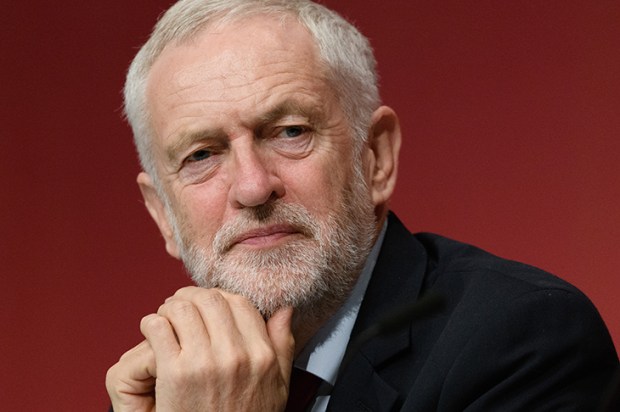‘Too tweedy? Goodness gracious me!’ Rory Stewart sounded startled. A contender for the Tory leadership, he was being interviewed by the BBC’s Paddy O’Connell last Sunday morning on Radio 4’s Broadcasting House. O’Connell asked the MP for Penrith and the Border how he responded to the criticism that ‘the Conservative party is too tweedy’.
A short discussion of the relationship between 21st-century Toryism and tweed followed, during which Stewart revealed that in his rural constituency ‘quite a lot of us wear some tweed’. Only ‘some’ tweed, mind you: Stewart sensed he was on tricky ground here. Leadership candidates in all parties get used to being asked if they’ve ever smoked weed — but worn tweed? How often? Just to be sociable? Experimenting? Tried it a couple of times but that was at university? Stewart sounded unsure whether he was being invited to confess a vice or parade a virtue.
But as both men knew, tweed was a surrogate for an issue unrelated to menswear. You could equally have brought brogue shoes, double-breasted suits or red corduroy trousers into the conversation as potential skeletons in a Tory’s cupboard, indicators of more deep-seated tendencies. Or — and now we’re getting warmer — wind turbines, gay marriage, HS2, political correctness, split infinitives, feminism, trans-rights…
…Or Brexit. I have a serious question to put, and for once (most Spectator readers will be relieved to hear) it isn’t about whether we should or shouldn’t leave the European Union. I’ll half duck that this week. As charming respondents in our online readers’ comments section like to remind any columnist who dares ask whether Brexit is actually a good idea: ‘We’re leaving. End of’, ‘Which part of the word “Leave” don’t you understand?’, ‘We’re out. Get over it’, ‘Suck it up’, etc. So — again, for once, and for the sake of argument — I’ll take Brexit as a given. We’re leaving — OK?
Leaving, however, will only be the beginning. After that, arguably more important decisions await. Are we to be a socially liberal, progressive-minded, forward-thinking nation, seizing and shaping a new economic future? Or shall we try to swim against the global current? How is a Leave–minded Britain, led by Leave-minded politicians, likely to approach that question?
As I’m not the first to observe, the Leave movement has proved a formidable coalition of two very different types of Brexiteer, often with little else in common. One group is much, much smaller than the other, but they’ve been vital to the argument, supplying most of the respectable intellectual ballast; whereas the larger group have supplied much of the passion — and, in terms of heft, the numbers.
It’s trainers and no tie, vs tweed and brogues. The Tweedies are essentially old-fashioned (I’m struggling to avoid the word ‘reactionary’) in their mental reflexes. The Trainers want a free-wheeling, outward-looking Britain, socially tolerant, open to audacity and big ideas. It’s an indication of the potential chasm, however, that most Trainers will have to google to find out what a split infinitive is; while most Tweedies still struggle to get their heads around the idea that you don’t wear trainers mostly for training.
Within each of these two groups, however, there really does exist predictable homogeneity as to what Trainers might call ‘mindset’ and the Tweedies might call ‘outlook’ .
I state not as a polemical assertion but as demonstrable through polling data that for the Tweedies there exist clear correlations between a range of opinions on non-Brexit issues in politics and society, and their enthusiasm for Brexit. I call these B-indicators. Anyone with a full suite of B-indicative opinions is almost certain to be a keen Leaver.
Now let’s take a look at the answer Rory Stewart gave Paddy O’Connell. Earlier in the interview Stewart had argued for ‘seizing issues like climate change, which are completely central to my beliefs’. Confronted now with the tweed issue, he declared his love for the monarchy, history, the military, etc — but went on to say this: ‘But I also love London, I love everything [about it]. I’m talking to you at the moment from around the corner from Hyde Park, and… you just look at all the people now walking through Hyde Park… alive with modern people, children, French tourists, Somali visitors…’
Your typical Tweedy, having already raised an eyebrow at the climate change stuff, would be grudgingly OK about French tourists but would seriously wonder what the hell Stewart was on about in mentioning Somalis. Somali ‘visitors’? More likely asylum seekers, surely? And if she or he were honest, they’d admit to a faint recoil from the idea of ‘loving everything’ about London (and a recoil, too, from my writing ‘she or he’).
And don’t get her (or him) going on global warming. Opinion polling suggests that the two most reliable B-indicators are being in favour of capital punishment, and dismissing or denying climate change. Immigration is up there too. You can guess which way the correlation lies as regards gay marriage and wind farms, but you might be surprised to find incipient hostility to large infrastructure projects, notably HS2.
A neuralgic response to ‘political correctness gone mad’ and opposition to the decriminalisation of drugs are two further B-indicators. Broadly speaking, this individual, had they been around in the 19th century, would have opposed plans for railways in general, and wanted nothing to do with votes for women. Today, high-speed trains and the #MeToo movement serve as boo-substitutes.
A writer I much admire (and a man I like), Charles Moore, has accused me of battling against people when I should be battling their ideas. But here Charles and I just have to differ. Ideas attract people. Which people? I’d always hesitate to judge the idea until I’d taken stock of the people it attracts. What other ideas, what other baggage, does this crew carry?
So sign up for Brexit by all means, but take a look at the company you’re in, because you’re signing up for them to take charge. And when they do, expect a lot more than Brexit.
Got something to add? Join the discussion and comment below.
Get 10 issues for just $10
Subscribe to The Spectator Australia today for the next 10 magazine issues, plus full online access, for just $10.
You might disagree with half of it, but you’ll enjoy reading all of it. Try your first month for free, then just $2 a week for the remainder of your first year.















Comments
Don't miss out
Join the conversation with other Spectator Australia readers. Subscribe to leave a comment.
SUBSCRIBEAlready a subscriber? Log in